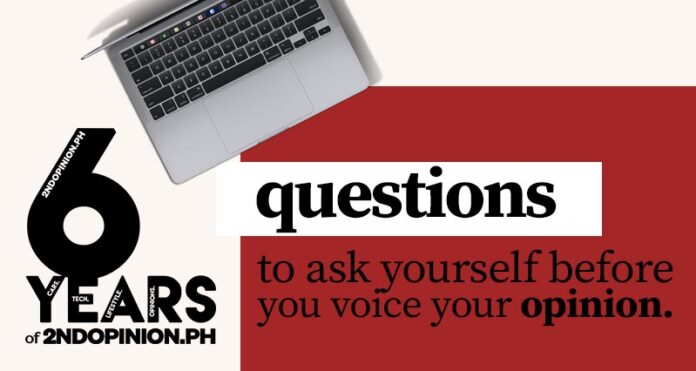The plethora of platforms that are available to us today gives many of us the opportunity to share our opinions and join discussions. This opportunity is actually a right; it is our freedom of speech. However, with the emergence of post-truth era which is characterized by the relativization of truth and the supremacy of emotional speeches in public discourse, we have seen how this has been jeopardized and distorted. There are multiple problems that come with the twisting of this freedom such as people losing sight of what the real issues are. In this article, we begin with the premise that our right comes with a responsibility. Nowadays, we cannot filter who gets to speak or not. But we can, always and always, filter ourselves and what we speak about.
To help you with this, here are six questions you could ask yourself before sharing your opinions:
- Who am I talking to?
- The global population of 7 billion people is enough reason for us to pause and ask ourselves this question. Aside from our physical limitations and language barriers which simply do not allow us to speak to all people simultaneously, the crucial part of knowing your audience is to make sure that your opinion makes sense to them. Communication is a two-way process. Thus, it is our job to take into account who our receivers are and the context surrounding them. This will help us tailor-fit our message so misinterpretation can be avoided.
- What is my objective?
- There is a telos, or a purpose, in every action including speaking out. With your opinion, do you aim to explicate, criticize, or just follow the trend? Whatever purpose you have for speaking out, that is up to you. But this is what we need to remember, not all objectives are worth pursuing. Many among us want to voice out their opinions with no objective in mind. Doing so results to nonsensical debates founded in fallacies and “e di wow” that don’t really contribute to the discussion but make it more challenging for us to reach a common understanding of things.
- Where am I coming from?
- The truth is, this should be the first question. But given this generation’s obsession to productivity, it is only realistic that we put it after asking the preceding queries. Now that we know who we are talking to and what we want to achieve, self-awareness is very important. If your opinion is made to criticize the government for their unfair treatment to the farmers or nurses or drivers, etc., ask yourself, why do I care about these people? Because in the end, the opinions that are worth sharing are the ones that we can live up to in reality. Asking this question will help us act on what we speak.
- How should I say this?
- The communication scholar, Marshall McLuhan, said that the medium is the message. This means that the means by which we share our opinions is as important as the message itself. Today, we are presented with multiple choices of channels. Some people use videos. Some others use photos. Artists draw. Journalists write. There are many ways to express your opinions. The important thing is to choose that which will help the audience understand you better without compromising the completeness and substance of what you want to say.
- Is it the right time to speak?
- Some messages would resonate more in certain conditions. Take for example, if your opinion is on indigenous people’s rights, perhaps it would be better to share them during the IP Month instead of the Christmas season when people are consumed about celebrating. This is not to say that there is a specific timeline for the discussion of our social predicaments but considering the factors such as fast-paced reading and short attention span, it is wise to know the best timing when to share the opinion.
- Does it adhere to the truth?
- Our opinions must correspond and respond to reality. We can’t just speak because we decided that from this day onwards, we will refer to wrong choices as “honest mistakes,” or incompetence as “limitations,” and so on. If we are to make valuable opinions, they must lead people to the truth. Not your truth. Not their truth. But the truth. Because there are no multiple realities, only subjective perceptions. And yes, objectivity is a myth. But our biases should not be based on blind loyalty and personalities and predetermined dispositions. Let us look out there and look at the facts. With this, we can commit to speak the truth. That is our bias. This is a cliché but it is true so we might as well remind ourselves: it is the truth that sets us free. The questions above are helpful as we claim responsibility and accountability in our opinions. We need to make sense in order to be heard. More than a challenge or an added work, we ought to see self-questioning as a means for us to guard ourselves from those who stifle us from speaking out. Freedom of speech is not just the being able to speak out. It is, most importantly, about freeing ourselves and others. From whom or what? From those who use their freedom to oppress other people. And from the lies that they have fed us with so they could benefit themselves. That is the real challenge to all of us – using our speech to claim our freedom.












